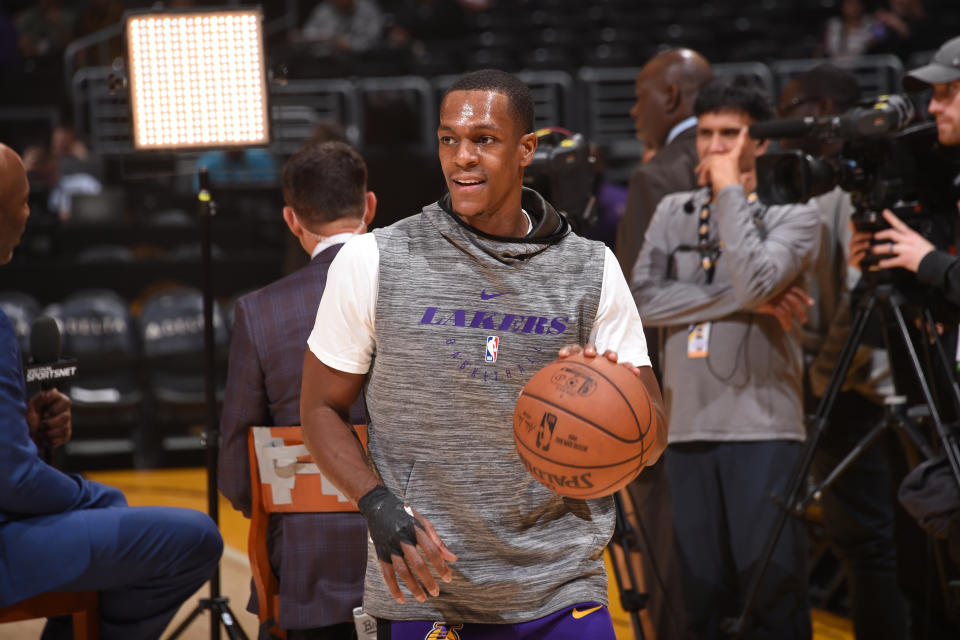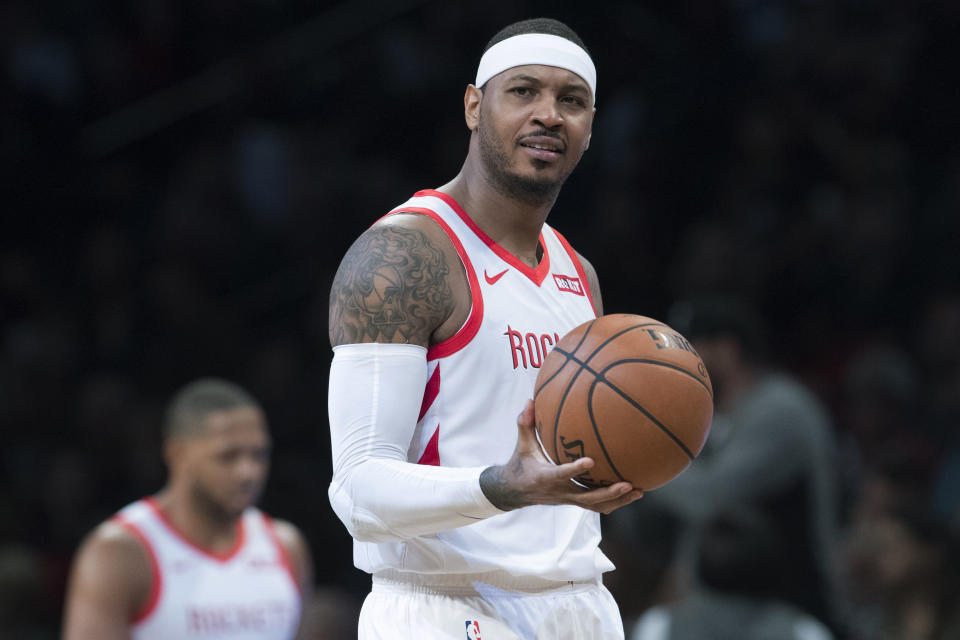Lakers have some assets to move as NBA early-trade window approaches
Each NBA season, what most teams call the “early-trade window” opens on Dec. 15. That’s when the vast majority of players who signed as free agents over the summer are eligible to be traded. When a team signs a free agent it is not allowed to trade that player for the period of time that is greater between three months or the arrival of Dec. 15. This is because the NBA and the players association do not want teams to sign players and immediately trade them if they later feel they made a mistake.
Even though this season has already seen three trades, from the Jimmy Butler blockbuster to the Cavaliers selling off veterans, trade action really picks up when the no-trade restriction ends on Dec. 15. NBA teams break down trade windows into four segments:
NBA draft: from the end of the season until draft night
Offseason: picking up after the draft through the start of training camp
Early-trade window: Dec. 15 to early to mid-January
Trade deadline: early to mid-January to the trade deadline Feb. 7
The early-trade window and trade-deadline portions may eventually combine into one with the trade deadline being pushed up ahead of the All-Star break. But each segment brings different opportunities for NBA teams. The draft and offseason windows are about setting up your team for the next year. The early-trade and trade-deadline segments are about deciding what you need to improve in the current season.
With the early-trade window about to open, there are several players who could be dealt. These players range from free-agent signings who didn’t quite pan out to players who have more value to their teams as trade assets. This list isn’t comprehensive. Instead, it looks at some of the key names to watch over the next few weeks before trade-deadline fever picks up in full.

Los Angeles Lakers trade chips
Kentavious Caldwell-Pope: He re-signed for a one-year, $12 million contract this offseason, one year removed from playing under a one-year $17.7 million deal. Essentially, KCP was signed by the Lakers to a two-year, $30 million deal in part because he shares an agent with LeBron James. It was a “you scratch our back, we’ll scratch yours” type of arrangement that has become increasingly common around the NBA. Now, Caldwell-Pope is on the trade market, in part because his $12 million salary is easily movable. One challenge? Because he’ll have early Bird rights following this season’s one-year contract, KCP has the ability to veto any trade. He’ll lose those early Bird rights if traded, giving him some power in picking his next destination.
Rajon Rondo: He signed a one-year, $9 million deal to be the veteran alternative to second-year point guard Lonzo Ball. Instead, Rondo was suspended for an on-court incident and then fractured his right hand shortly after returning. And the Lakers haven’t really missed a beat without him. Because his contract is easily tradable, and teams are always looking for point-guard help, Rondo is one to watch.
Michael Beasley and Lance Stephenson: They are in similar spots. When the Lakers missed out on adding a second max player this summer, they pivoted to one-year deals. Beasley and Stephenson make $3.5 million and roughly $4.5 million, respectively. While neither has a ton of on-court value, those salaries could go a long way toward matching money in other deals for L.A.
On the market
Trevor Ariza, Phoenix Suns: Ariza has seemingly been on the move since signing his one-year, $15 million contract. It was an odd signing at the time, and the Suns’ lack of success this season has made him a luxury on a lottery team. Ariza will be dealt. The only question is where and when. Recent reports have the Los Angeles Lakers interested, but Phoenix won’t have a shortage of suitors for the veteran wing.
Carmelo Anthony, Houston Rockets: Anthony didn’t earn a starting role out of training camp and didn’t adapt to a bench role. He’s been away from the Rockets for about a month now as the team has awaited the trade window. Anthony’s on a minimum deal, which means he could simply be waived. But Houston is adamant about avoiding a luxury-tax hit if it can. That means the Rockets will look for a trade for Anthony until it’s abundantly clear they can’t find one. Then they’ll likelty move on via waivers.

Guard signings that aren’t quite working out
Yogi Ferrell, Sacramento Kings: After backing out of a deal to re-sign with the Dallas Mavericks, Ferrell inked a two-year deal with the Kings. This season is for just $3 million and next year is at $3.2 million but is fully non-guaranteed. That is an easily movable contract. Ferrell is out of the Kings’ rotation, as De’Aaron Fox, Buddy Hield, Bogdan Bogdanovic and Frank Mason III have blossomed. Sacramento could return a small asset in exchange for Ferrell.
David Nwaba, Cleveland Cavaliers: When the Chicago Bulls nonsensically decided that Nwaba wasn’t worth a minimum contract, the Cavs swept in and snatched him up. Nwaba’s been nicked up and out of the rotation in the morass of guard options in Cleveland. His minimum contract can be absorbed by any team in the league that is looking for some defensive help on the perimeter.
Easy-to-move big men
Kyle O’Quinn, Indiana Pacers: O’Quinn has played well for the Pacers, but it’s come in very limited minutes. Myles Turner and Domantas Sabonis hold down the majority of minutes at the center spot, and second-year player T.J. Leaf is starting to come on as well. If O’Quinn could be moved in a deal that brings back a wing defender, it would be something for Indiana to consider.
Ed Davis, Brooklyn Nets: Davis is similar to O’Quinn in that he’s played well, but he’s a key rotation player for Brooklyn. The reality, though, is a productive backup big is a luxury a bad team doesn’t really need. If Davis can fetch a small asset for the Nets, GM Sean Marks would do well to move him.
Jan. 15 trade group
Teams have to wait an additional month to move these players because of the conditions they re-signed under. These teams used Bird rights and are over the cap, and the players got a 20 percent or greater raise from the previous season.
Avery Bradley, Los Angeles Clippers: Bradley has become somewhat marginalized since he re-signed with the Clippers. He’s still starting, but Los Angeles has a lot of options in the backcourt. Bradley’s contract for this season is for $12 million, but just $2 million of his $12.9 million for 2019-20 is guaranteed. He’s still regarded as a top perimeter defender, making him a valuable commodity if the Clippers wanted to move him.
Fred VanVleet, Toronto Raptors: VanVleet is a key rotation cog for the Raptors, but if they eventually find themselves with a hole in their roster, he’s a candidate to be traded. Toronto has good point guard depth with Kyle Lowry and Delon Wright. VanVleet could bring back a nice asset, as some teams around the league view him as a starting-caliber lead guard.
Derrick Favors, Utah Jazz: Favors re-signed on what is a de facto one-year, $18 million contract. He’s signed for 2019-20, but that year is fully non-guaranteed. The Jazz are off to a bumpy start, and Favors has been in and out of the starting lineup, depending on matchups. If Utah decides to go in a different direction, Favors would be a great option for playoff teams that need another big man, but value cap flexibility this summer.
Joe Harris, Brooklyn Nets: The Nets love Harris, one of the true finds in Marks’ diamond-mining process. He’s become one of the league’s better shooters, and he’s better than you think at everything else. But like Davis, he’s somewhat of a luxury for Brooklyn, as they have a lot of other wing options. If the Nets can get a shooting-needy team to offer up a nice package for Harris, Marks will jump on it.
Rodney Hood, Cleveland Cavaliers: Hood is in a unique situation. He signed his qualifying offer as a restricted free agent last summer. That makes him an unrestricted free agent in July with full Bird rights. If he’s traded, he loses those rights, so he has veto power over any deal. That makes it more of a challenge to move him, but Hood may want off Cleveland’s rapidly sinking ship. Playoff teams often place a premium on bench scoring, so Hood could get the Cavs an OK asset in return. Given the full-scale selloff happening in Cleveland, keep an eye on Hood as possibly one of the next to go.
More from Yahoo Sports:
• Ex-MLB star makes absurd offer to President Trump
• Heisman winner Kyler Murray has tough choice to make
• College hoops player sued over sex tapes
• Dana White on Oscar De La Hoya: ‘He’s a liar and a phony’

